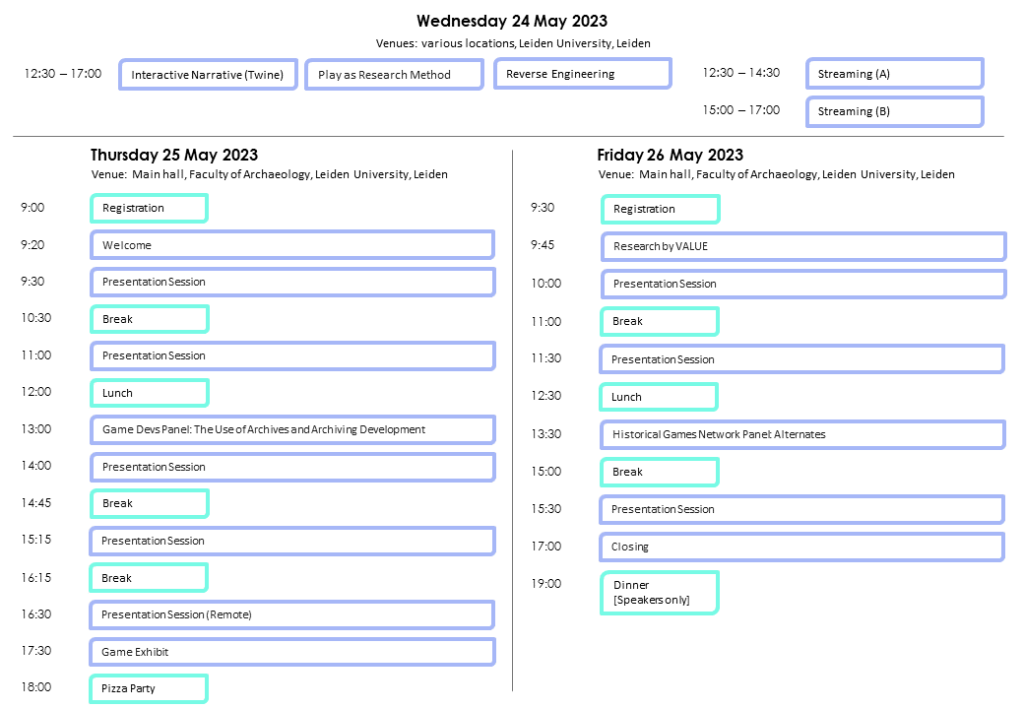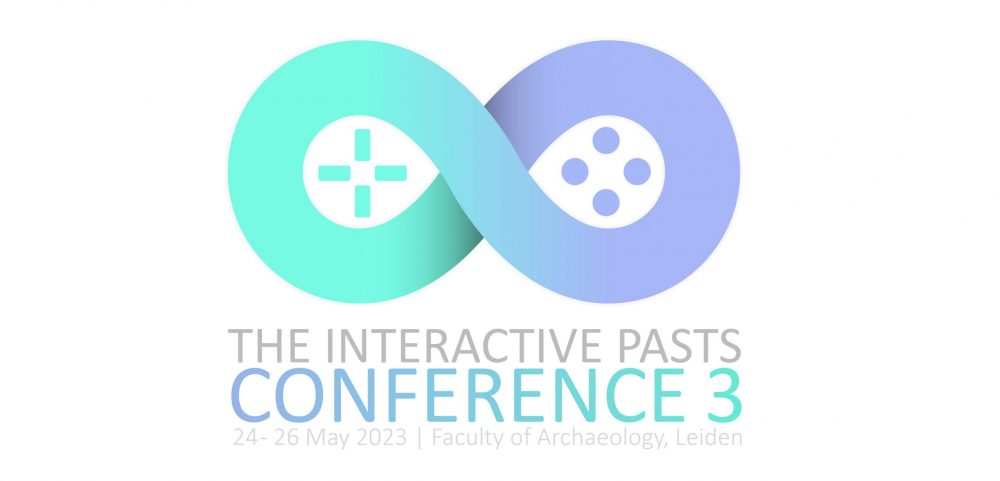The Interactive Pasts Conference (TIPC) is an event where we get together to celebrate our joint love for video games and the past and share our playful, creative, smart, cool, beautiful ideas with each other.
The theme of this third in-person edition of TIPC is ‘The Rise of the Playground’. It is inspired by the diverse and multi-perspective work that has grown and thrived in the playgrounds at the intersection of the past and video games, including scholarship, game development, and other knowledge-based or creative practices.
You can expect to learn about the development process of video games set in the past, the use of AI to play ancient board games, representation and authenticity of pasts in video games, the interests and identifications of players, and many more awesome topics.
For information about locations and routes, check out Locations below! For the program booklet, click here!
Program Overview
TIPC will take place over three days, on 24-26 May 2023 in Leiden, the Netherlands. The first day, Wednesday 24 May, will consist of an afternoon of workshops. Conference participants will be able to sign up for one of four workshops when they register, all of which will take place at Leiden University venues within Leiden. The other days, Thursday 25 and Friday 26 May, are for paper presentations and panels which will take place in the main hall of the Faculty of Archaeology, Leiden University. For the first time, TIPC3 will also include a Game Exhibit in which you can try out historical and other past-related video games on site!

Full Program
Check out the program at a glance or, for all the information, the conference program booklet.
Want to get into the details of each paper presentation? Read the book of abstracts.
Locations
May 24: Workshops
The workshops will be hosted in different buildings in the Leiden City Centre. Click the links for detailed wayfinding.
Interactive Narrative (Twine): Room 1.07 of the P. J. Veth Building.
Play as Research Method: Room B0.07 of the Arsenaal Building.
Reverse Engineering: A Gentle Introduction: Room 1.31 of the Lipsius Building.
Streaming: Room 1.06 of the P. J. Veth Building.
May 25 & 26: Presentations and Panels
The main two conference days will be held at the Van Steenis Building (Faculty of Archaeology), Einsteinweg 2, 2333 CC in Leiden. You can use this link to plan your route through Google Maps, or use the route below from Leiden Centraal Station. It’s a 20 minutes walk, or a 5 minute bike ride from the station (you can rent a ‘OV-bike‘ at the station).

Workshops
Participants of TIPC3 can choose to join one of four workshops.
Interactive Narrative (Twine)
Lead by a member of the VALUE Foundation and open to 20 participants.
This workshop will be hosted in room 1.07 of the P. J. Veth building in Leiden City Centre (Nonnensteeg 1-3, 2311 VJ Leiden). You can plan your route with this Google Maps link. It’s a 15 minute walk from Leiden Centraal Station.
The P.J. Veth building is located in the garden areas opposite the Hortus botanicus. If approaching from the Lipsius direction, walk through the Hortus botanicus outside café seating area, around the glass house, and then almost the length of P.J. Veth. If approaching from the station/city centre, you can enter through the gate of the Academy Building (the black fence). The P.J. Veth will be on your left.
Enter the building via the main entrance staircase, below the sign ‘P. J. Veth’. Wayfinding will be provided on site.
Play as Research Method
Lead by a member of the Historical Games Network and open to 20 participants. Please note that this workshop is fully booked.
This workshop will be hosted at the Arsenaal Building, room B0.07 (Arsenaalstraat 1, 2311 CT Leiden). You can use Google Maps to plan your route. It’s about a ten minute walk to the Arsenaal from Leiden Centraal Station.
Reverse Engineering: A Gentle Introduction
Lead by John Aycock and open to 20 participants.
This workshop will be hosted at the Lipsius Building, room 1.31 (Cleveringaplaats 1, 2311 BD Leiden). You can use Google Maps to plan your route. It’s roughly a 15 minute walk from Leiden Centraal Station.
Streaming
Lead by a member of the VALUE Foundation in our studio, this 2-hour workshop will run twice to accommodate 2×6 participants.
This workshop will be hosted in room 1.06 of the P. J. Veth building in Leiden City Centre (Nonnensteeg 1-3, 2311 VJ Leiden). You can plan your route with this Google Maps link. It’s a 15 minute walk from Leiden Centraal Station.
The P.J. Veth building is located in the garden areas opposite the Hortus botanicus. If approaching from the Lipsius direction, walk through the Hortus botanicus outside café seating area, around the glass house, and then almost the length of P.J. Veth. If approaching from the station/city centre, you can enter through the gate of the Academy Building (the black fence). The P.J. Veth will be on your left.
Enter the building via the main entrance staircase, below the sign ‘P. J. Veth’. Wayfinding will be provided on site.
Game Dev Panel: The Use of Archives and Archiving Development
Featuring Chella Ramanan (Windrush Tales), Jennifer Schneidereit (Astrologaster) and Gregorios Kythreotis (Sable), and chaired by Florence Smith Nicholls (Die Gute Fabrik), this panel will hold a discussion on the various ways that the past is drawn upon by game developers. In particular, we’ll discuss the role of archival research in the development process, and the perception of ‘historical accuracy’ by players and creators alike. Finally, we’ll reflect on our own personal histories as game developers, and how we hope our games will be remembered.
Historical Games Network Panel: Alternates
The VALUE Foundation and the Historical Game Network will facilitate a discussion panel with invited speakers and audience participation around the theme ‘Alternates’. The theme focuses on games that utilize alternative history or future history and if anyone is interested in contributing the Call for Contributions is open. The panel aims to facilitate discussions to consider how alternative history is used and to look at players engaging with historical themes in non-historical contexts.
Game Exhibit
At the game exhibit you will be able to try out and play a number of games and demos which have been featured in presentations during the conference. The exhibit will include 13 Rosas, Agony Haunt, Berlin Maniacs and The Hajj Trail. Additionally, you can try out some 80s and 90s games from the developer Wisdom Tree. For those interested in ancient games, check out the Ludii game playing system and its database of 1000+ digitally implemented board games by playing against each other or an AI player.
Registration
The registration for the conference is now closed. You can always attend the conference through our Twitch channel: Streaming the Past.
Costs?
We believe knowledge should be as accessible as possible. This is why TIPC registration has always been, and will continue to be, 0, nada, zilch, zip! To sweeten this free deal, registration will include lunch, coffee/tea, and a pizza party for all 🙂
Join Online
TIPCs cherish face-to-face encounters. Although the program includes one session of pre-recorded video presentations, all other presenters will speak from a lovingly crafted podium in front of a lovely live audience. At the same time, TIPCs have always been shared online, so the conference – excluding the workshops – will also be streamed straight to our Twitch channel. No need to register, just show up and chat along!
Check Out Past Editions
TIPC3 follows up on the first TIPC in April 2016, TIPC-Online in May 2017, TIPC2 in October 2018, and TIPC-Online 2 in November 2020. If you would like some inspiration of the vibe and topics discussed at these events, you can check out all the presentations of TIPC1, TIPC2, and TIPC-Online 2 on YouTube. If you want to kick back with some interesting reading, may we suggest the books The Interactive Past & Return to the Interactive Past. And, yes, there will be another, open access Interactive Past book resulting from TIPC3.
Organization
The VALUE Foundation is in charge of organization. Additional financial support is provided by the Past-at-Play Project and the Playful Time Machines Project.
Programme Committee
Corine Gerritsen — historian, master of coins, and board member of the VALUE Foundation
Leyla Johnson — game developer, lost Phoenician, and history books binge-reader
Sybille Lammes — media scholar, hardcore punk lady, and professor at play
Angus Mol — human digitalist, random doctor, and board member of the VALUE Foundation
Aris Politopoulos — playful archaeologist, bearded person, and board member of the VALUE Foundation
Nick Webber — game and history scholar, 90s goth relic, and co-convener of the Historical Games Network





